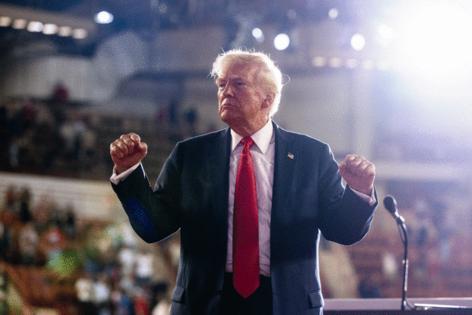'Inflation is more costly ... than we thought': What voters say motivated them to vote for Trump
Published in News & Features
PHILADELPHIA — Sitting at his family's vacation home in Sea Isle City, New Jersey, Thomas Gianchetti lamented his rising energy bill. And, also, wokeness; diversity, equity, and inclusion initiatives; transgender athletes competing in women's sports; and undocumented immigration.
"I used to pay like $180 when I was working five days a week as a steamfitter," said Gianchetti, who retired from Steamfitters Local 420 in 2022 after a 37-year career. "My bill last month was $240-something. It's crazy."
Gianchetti describes himself as "fortunate" despite his higher bills. He said he's not living paycheck to paycheck and expressed gratitude to the labor union that supplied him with fair wages and a pension after retirement. Yet the economy was top of mind when he voted for President-elect Donald Trump last Tuesday near his year-round home in Aston, Pennsylvania.
In Pennsylvania, economic anxiety, along with shifting sociocultural sentiments, fueled voter turnout in Trump's favor. Voters around the region who cast ballots for Trump described the ways they watched their household costs rise or adjusted their lifestyles to live more comfortably over the last four years, and how they believe things like Trump's mass-deportation pledge will improve their own circumstances.
But when economists zoom out and look at indicators like wage growth, employment, gross domestic product (GDP), and inflation, they generally point to a thriving economy. Pennsylvania's unemployment is even lower than the national average, and wages are keeping pace with inflation, on average.
Still, GOP messaging on the economy, and a marketing campaign that linked economic issues with other grievances, seems to have broken through with voters, said Erasmus Kersting, a Villanova University economics professor and department chair.
"It's hard to tell, I think, whether a lot of this was genuine economic grievance," Kersting said, "or whether it was also a very successful ... misinformation campaign."
And yet while negative ideas about the economy aren't always reflected in data, people are experiencing increased costs and changing financial dynamics.
Jennifer Mimm of Narvon owns a window-tinting business and said she had to pick up a career in nursing to keep up with the rising cost of living.
"I had to forfeit my gym membership, not just because of the price, but because of how far I was driving, just to stay above water," Mimm said.
These personal experiences shape perception and can confirm biases, economists say.
"Somehow they're latching on to the bad signs, and not giving much value to the actual good trends," said Lonnie Golden, a labor economist and professor at Pennsylvania State University.
'Fairly compensated,' but 'they feel the pinch'
Benjamin Hickenbotham of Kennett Square is the chief operating officer at a consulting firm.
He said his household expenses for proteins at the grocery store have increased by about 40%, and he worried that Harris' housing plan — which partly includes providing $25,000 to first-time homebuyers — would raise home prices.
Hickenbotham believes Trump's tariffs will improve U.S. production and prices in the long run, an idea economists dispute. He also said employees who left his firm in search of better wages hurt the business.
"Even though people are fairly compensated, because they feel the pinch as well, it causes sort of disquiet among the ranks," Hickenbotham said.
Mimm cited Trump's immigration policy as one that she believed will improve her own economic circumstances.
"I guess the deportation is going to be huge for the economy, because getting a ton of illegal immigrants out of our country that we're currently paying for, and our tax dollars, is going to save us money," she said.
'Inflation is more costly' than politicians realized
Social science has also shown that even if individuals are faring well, they are less likely to be satisfied with their own economic positions if they think others are doing better.
Voters might be responding to their perception of how well they are faring compared with other people.
"People are always doing these comparisons, either to their past, to their reference groups like neighbors, siblings, or coworkers," said Golden. "Maybe immigrant groups are another reference point."
As a result, voters might have been more likely to tie different political topics marketed by the Republican Party to their own fortunes, even if they aren't related or the messaging is not accurate. Mass deportations, for example, would be inflationary and raise costs, Kersting said.
"So there may have very well been a success in sort of muddling voter perceptions between grievances that are not directly economic with those that are sort of economic," Kersting said.
After the 1990s, there was a seismic shift in ideas about voter attitudes that popularized the phrase "It's the economy, stupid," Kersting recalled. He emphasized the dramatic impact that pandemic-fueled inflation seems to have had on the nation's psyche even years later.
"I think one thing that we might be learning is that inflation is more costly, politically speaking, than we thought," Kersting said.
©2024 The Philadelphia Inquirer, LLC. Visit at inquirer.com. Distributed by Tribune Content Agency, LLC.







Comments